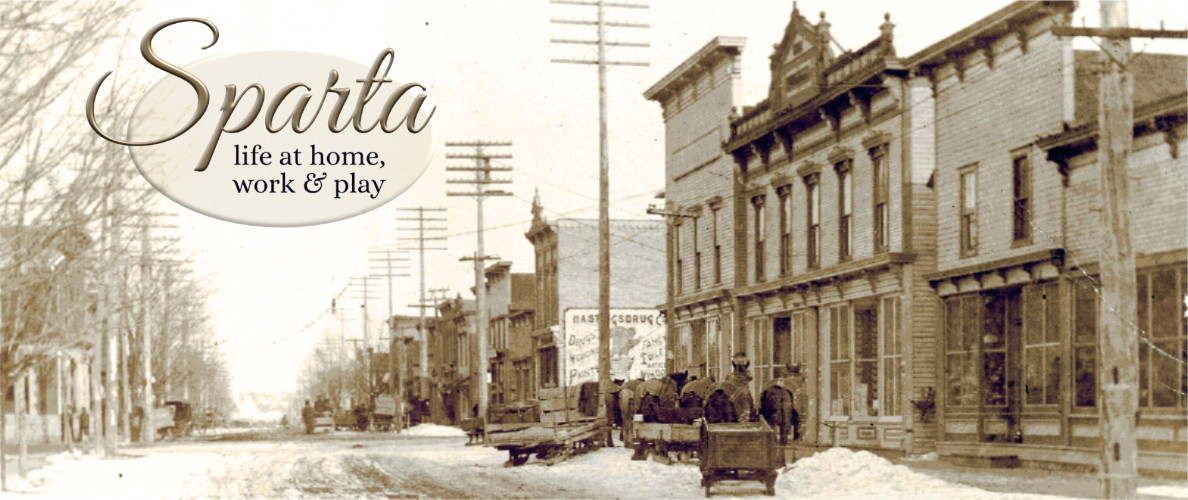

Village Articles
Competitive Spirit "Nelson A. Shaw: Horse Sense"
Businesswomen Sparta's Millinery Mavens: "Catherine Roberts & Rose Adelia Gaut: Mother-Daughter Hatters", and "Dora May Clute: Self-Made Woman"
Milo & Ben The stories of two friends and early Sparta businessmen: "Milo Bolender's Pharmacy" and "Dr. Benjamin Zudzense & His Monkeys" with "Pinckney Paints the Town"
Main Street Merchants "Charles Henry Loomis", "Frank Cnossen: There's Friendship in the Cup", and "Hugh Finch: Where You Always Do a Little Better"
Hometown Heroes "George W. Powers Murdered Lawman" and "Mad Dogs & Marshal Meeker"
The Highway Arrived State Street corridor and post-war growth: "Camp Boys Come to Town" and "Sparta Builders" addressed the housing shortage
Merry & Bright How we celebrated: "Charlie Badgerow: Two Christmas Gifts", Christmases Past", "A Very Sparta Christmas", "My Christmas Memories", and "Sparta's Easter Bunny Helper"
The Heart of
the Village
After the first seeds of community were planted in Sparta's early days, the landscape of buildings, businesses, faces, and names began to evolve. Change is an ever continuing process yet Sparta's downtown has always been - and still is - The Heart of the Village. It's more than just the buildings. Our history is the story of the People.
Editor's note: The Village banner photo is courtesy of the Karl Nickolai Collection.
Among Sparta's early settlers was blacksmith Peter A. Sleeper and his wife, the former Emily Sawyer, who arrived in 1860 or 1861 from Concord, New Hampshire. The parents of five children, only two survived to adulthood: Emily Henrietta (Sleeper) Seaman and the youngest, Henry Milton Sleeper.
Henry was just a boy of eleven years when he first laid eyes on Sparta; a place where he would be educated, married to Fidelia C. Snyder, and support his family on their farm.
As a young man of thirty-three in 1882, Henry was one of the local "big boys" Principal A. Hamlin Smith drafted to help plant the iconic maple trees at the white brick high school on the north end of town. By 1886, Henry had been elected to the office of Sparta Township Clerk. In about 1897, Henry moved to Grand Rapids with his wife where a few months later their daughter, Augusta, was born. Henry took a variety of positions: as a driver, a conductor, a bookkeeper, a laborer in the manufacture of refrigerators, and eventually became a machinist at a furniture factory. Later in life, after Henry suffered the loss of his wife, fond hometown memories tugged at his heart. Henry reflected on his boyhood years and put pen to paper.
Former Sparta Pioneer Describes Historical Background of Village in Interesting Letter
by H.M. Sleeper
From the Sentinel-Leader Letter Box, January 3, 1935
Editor of the Sentinel-Leader:
In looking over the village on my last visit to your office it called my attention to the growth and present position the village occupies.
I was forcibly reminded of my first visit to Nashville, now Sparta. In 1860 I stood in the road, it had not attained the dignity of a street, in front of where your present office now stands, and looking west I pictured the outlook. I can describe my feelings very nearly by quoting the exclamation of an Englishman on his first visit to America, "A country of magnificent distances."
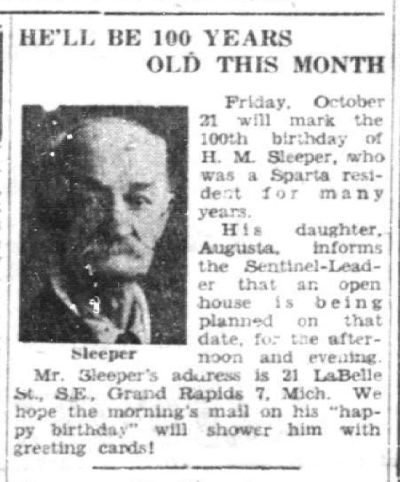
Henry Milton Sleeper was a pioneer resident of Sparta who penned several letters to the editor during the mid 1930s. The item for his 100th birthday appeared on Oct 6, 1949, in the Sentinel-Leader.
I stood there and could count the total number of residences on my fingers and thumbs by using two toes to complete the count.
A little old shack, standing where the Dr. Zudzense house now stands and occupied by Sam Mapes. Sam had some of the habits of the wandering Jew, only he was Irish. Later his place came into the hands of Pa Sleeper, a blacksmith. Still west and on the left, J.E. Nash and his family lived in a small brown house.
Still farther west and across the road Mr. Swan and his son, Eben, lived in a little old building as devoid of paint as a saloon keeper is of morals. Later that building was bought by James Teeple, but more of that later.
Next west, now the residence of Mrs. Cheney, owned at that time by Volney Bloss who lived there with his family, Sarah, Frankie and George. Bloss owned and ran a threshing machine. Later he sold and moved on a farm northwest of the village.
At that time the Methodists had a parsonage and a small church next west of Bloss's. Across the road stood a small wooden building. Its style would not remind you of the shades of Barrister Blackstone but he was there. Jared Chapel. Attorney-at-Law. Jared is worthy of more comment but we will pass his now.
The next lot west held the little one-story schoolhouse where those puzzling questions were so ably handled by Thurston, Leggett and later A.H. Smith. Then west to the old rambling farmhouse of Rodney Hastings who lived there with his family. Just west of his orchard he gave to the village two acres for a cemetery.
North and east of his place was the old mill pond fed by Nash Creek. It flooded about forty acres. Summertime it proved a treasure ground for us boys even equal to Mark Twain's swimming hole.
Hastings was confined to his wheelchair caused by exposure when he and Nash dammed the creek, this forming the pond. This creek furnished power for the old saw mill with its upright saw with its leisure movements giving convincing proof that the race is not always to the swift. R.H. Woodin was operator. He was living in a little house north of the mill in the woods and, by the way, it was all woods that side of the pond to Balcom's farm. Later the mill was taken over by the Lowe brothers who converted it into a stream mill, after awhile selling out to W.I. Olmstead with Jack Dyer from Canada to run it.
On the corner north of where the Baptist Church now stands, a solitary house held the corner. Farther south a little house was occupied by the Reynolds family. Next stood Horace Snow's place. Next came the Fulsom farm, at the time occupied by the Powers family. One boy, George, became active in the police force and was killed arresting a criminal.
Lest we forget, at the corner later known as Division and Mill stood the timber frame of a cellar. This lot was given by Nash to Balcom to build a hotel. Either the deacon's faith, ambition or money failed, and the foundation stood for years as a decaying reminder of man's delay. Later the deacon built the hotel which was known for years as the Balcom house. Good old Deacon, he should be wearing a golden crown. The filling into this ground is mostly lacking. The first clerk of the Incorporation has kindly promised me some interesting facts of business and people.
H.M. Sleeper, Grand Rapids
Hugh Finch:
Where You Always
Do a Little Better
Three generations of the Finch family operated a business in Sparta, which began in 1911 when The Sanitary Market was founded by the partnership of E.M. Finch & Son. An August 1912 advertisement in the local paper highlighted their "Wholesome Meats" and went on to say: "Our stock is the kind that will give perfect satisfaction, and our prices are so low as to merit your admiration." It ended with the slogan "Where You Always Do a Little Better" which was descriptive of their business philosophy.
Edgar Mead Finch
September 11, 1861, marked the birth of a son, Edgar Mead, to James Noah & Nancy Elizabeth (Rice) Finch at Ada in Kent county, Michigan. The parents were natives of New York State and had migrated with extended family to Kent county in 1855. James, a farmer and lumberman, purchased 80 acres at Solon township prior to 1876 on the south side of what is now 17 Mile Road between Pine Island and Lime Lake Drive. On October 4, 1883, Edgar married Anna Jane, a daughter of neighbors Henry & Ellen (Johnston) Bloomfield. The young couple welcomed their son, Hubert Levern Finch, on the 12th of September in 1887 at Solon township.
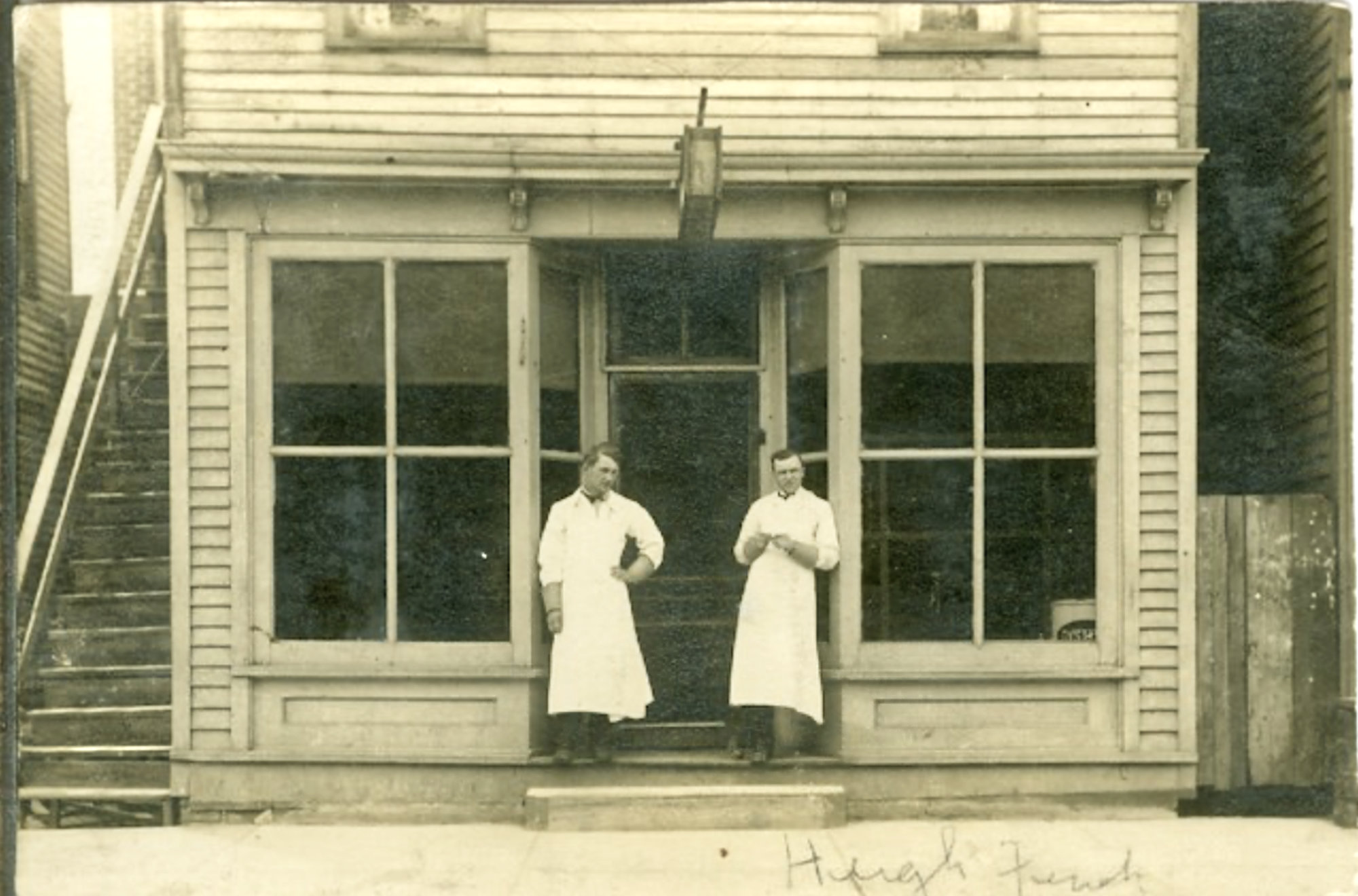
Miner and Hugh Finch outside of their business The Sanitary Market--courtesy of the Sparta Township Historical Commission Archives
When James passed away in 1890, Edgar inherited the farm and his personal land holdings increased to 150 acres. They farmed until a business opportunity brought the Finches into Sparta in 1911 when they opened their meat market. The father and son became known by their nicknames--Miner and Hugh--as they built a reputation for quality meats at a fair price.
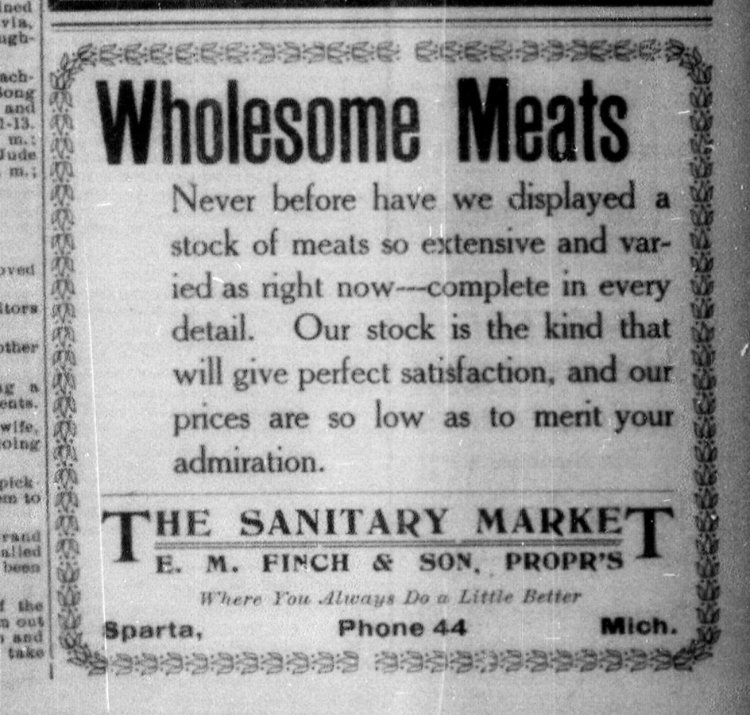
Early advertisement from The Sparta Sentinel-Leader dated 2 Aug 1911--courtesy of the Sparta Township Historical Commission Newspapers Repository
Hubert Levern Finch
For Hugh, 1913 became a notable year as the Sparta Sentinel-Leader reported an announcement on June 13th that Both Meat Markets Change Hands This Week. After twenty-eight years, Mr. Haas decided to retire. He and his partner of five years, William Powers, sold their shop to "Butch" Cornell, who, for the past year, worked as a butcher at Finches'. "On Monday Hubert Finch purchased his father's interest in the meat market and will go it alone. Mr. Finch will continue in the wholesale business as formerly. By strict adherence to business Hube says he hopes to merit your continued patronage."
Later that year, wedding bells rang on the first of November for Hugh and Mina Delora Cumings. The bride's parents, Norman Z. & Minerva L. "Minnie" (Vincent) Cumings, were life-long Sparta residents from early settler families. Soon the young couple were joined by a son, Clare Everett Finch, on December 26, 1914.
Fish Tales
Devoted fishermen, the Finches spent their free time following the pursuit. The Sentinel-Leader reported at length on a newsworthy expedition Finch and local fishing buddies made in May of 1918: "STRANGE QUADRUPED ENDANGERS FISHING PARTY--A fishing party composed of Frank and M.D. Culver, C.T. McCready, Hugh and Ed Finch, Harry Brace, Dr. A.J. Stamp and Eugene Mangles(?) left Tuesday for Lake county on a fishing trip of several days."
"So far no authentic reports have been received from the party, nor any statistics as to the catch. However, a report has filtered through that the camp has had its share of excitement. A huge animal stumbling through the woods ran up against the tent, so the report goes, and practically wrecked it. It stepped on Doc Stamp's leg, also in a crock of beans, and carried off the crock on its foot and upset things generally in the tent."
"It develops that the strange beast which did the damage and brought such a fright to the boys was no more or no less than the hugag. The hugag is described by competent authorities as follows:"
"The hugag is a huge animal of the Lake States. Its range includes western Wisconsin, northern Minnesota, and a territory extending indefinitely northward in the Canadian wilds towards Hudson Bay. In size the hugag may be compared to the moose, and in form it somewhat resembles that animal. Very noticeable, however, are its jointless legs, which compel the animal to remain on its feet, and its long upper lip, which prevents it from grazing. If it tried that method of feeding it would simply tramp its upper lip into the dirt. Its head and neck are leathery and hairless; its strangely corrugated ears flop downward; its four-toed feet, long bushy tail, shaggy coat and general make-up give the beast an unmistakable prehistoric appearance. The hugag has a perfect mania for traveling, and few hunters who have taken up its trail ever came up with the beast or back to camp..." An invitation was given to stop by the newspaper office to see a picture of the creature.
Like the ferocious hodag from Wisconsin's northwoods, it and the hugag were fearsome legends from the lumberjack era which became a part of American forklore.
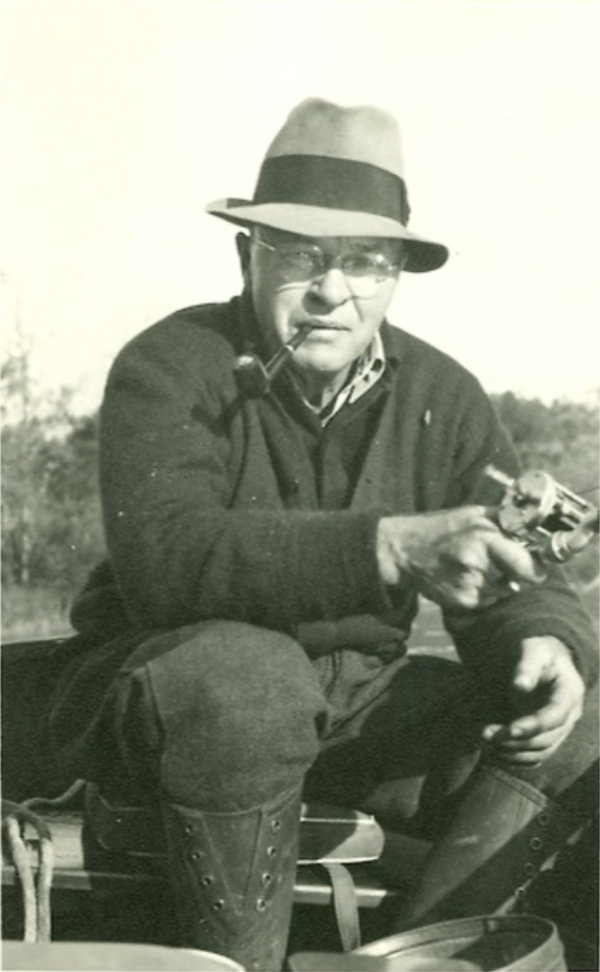
Hugh Finch enjoying a favorite past time--courtesy of the Sparta Township Historical Commission Archives
Unofficially, a competition among local sportsmen of one-upsmanship spun some mighty entertaining tales about their exploits. Imagine their surprise when the fishing party returned home to find they were the talk of the town with the storytelling tables turned on them!
Besides fishing, Hugh enjoyed hunting partridge with his well-bred English setters and occasionally raised a litter of pups. Sadly, one of his dogs made front page news: "HOT DOG--The fire department was called to the west end about midnight Tuesday to put Hugh Finch's dog out. Hugh's dog had been in ill health and to make him comfortable Hugh had added a more or less modern heating plant to the dog's kennel. This went on a rampage and the kennel, dog, and all took fire. The fire department was too late to save either.--Beware of fire!"--Sparta Sentinel-Leader (5 Dec 1924)
A dozen years later, "ILL LUCK CONFRONTS LOCAL FISHING PARTIES--A roadside blaze played havoc with fishing equipment belonging to Mr. and Mrs. Hugh Finch, James Nieboer and Elgin Gorby who were fishing on the Au Sable River over the holidays. Their tents and approximately $600 worth of fishing equipment were destroyed. They were away at the time and arrived too late to save their effects when the alarm was sounded. The Finch automobile miraculously escaped burning up although a grass fire passed directly underneath their car."--The Sentinel-Leader (9 Jul 1936)
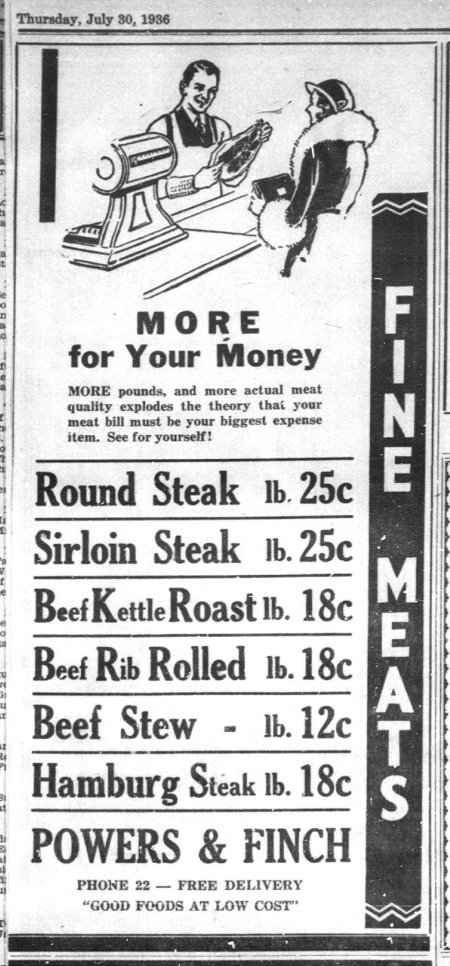
--Powers & Finch advertisement dated 30 Jul 1936 courtesy of the Sparta Township Historical Commission Newspapers Repository
Third generation, Clare Finch, officially joined his father in the business in October of 1936 when William Powers, who was a partner for fifteen years in the Powers & Finch market, sold his interest to the co-owner, Hugh Finch.
A crime wave struck the west side of Sparta at the start of summer in 1938 when state police, sheriff's officers and the local police conducted a manhunt for the burglar who, overnight, entered five local residences. "Dr. F.L. Bull reported he was awakened by a flashlight shining in his face. When he asked the intruder what he wanted the man fled, he said. Dr. Bull then called Marshal Clifford VanderHout. Before the marshal could respond, he received calls from Hubert Finch, Charles Warren, Martin Norton and A.C. Cutler, who reported the burglar had invaded their homes. At the Norton residence he picked up three pairs of trousers and found $5.70."--Grand Rapids Press (26 May 1938)
The local paper ran a follow-up article in their next issue (3 Jun 1938): "FIRST-HAND EVIDENCE--There is no question in the minds of Sparta people what a burglar, or a group of burglars were caught in the act of burglarizing some of our homes one night last week. We have it on good faith that Dr F.L. Bull and Hugh Finch were among those who got a fairly good glimpse of the burglar while pilfering their homes. Dr Bull states he could easily have captured the burglar had his watch dog been on the job. It is said that the doctor now sleeps with a ball-bat under his pillow. Hugh Finch states that he was not frightened when awakened by the burglar, but that the next night he could not sleep a wink, he was so scared. In case anyone is planning a night visit with the Finches, we suggest that you phone them in advance for the place is heavily guarded now. In fact we have been informed that Hugh sleeps on his high powered deer riffle every night, with the additional protection of his sheep dog, which sleeps on or under the bed."
Poking good-humored fun at one another continued between the editor, H.J. Kurtz, and H.L. Finch. It certainly kept things lively.
Hugh participated in civic groups to which he generously provided his time and resources towards the cause of making Sparta a great place to live. "The Sparta Rotary Club steak fry, which was held at Bill Schaefer's Peach Ridge farm Monday night proved to be a decided success in more ways than one. Most of the members turned out early to enjoy the big feed prepared for them by Lawrence Johnson, chief chef and his assistant, C.J. Lonnee, on the big out-doors fire-place."
"Both Mr. and Mrs. Schaefer deserve the thanks of the club for the hospitable manner in which they entertained the members. There was plenty to eat, steak sandwiches, pie, ice cream, fruit, etc., and everyone had a fine time excepting the editor who experienced one of the "toughest" times of his life," Horace Kurtz related the details of the event in a July 1938 issue of The Sentinel-Leader.
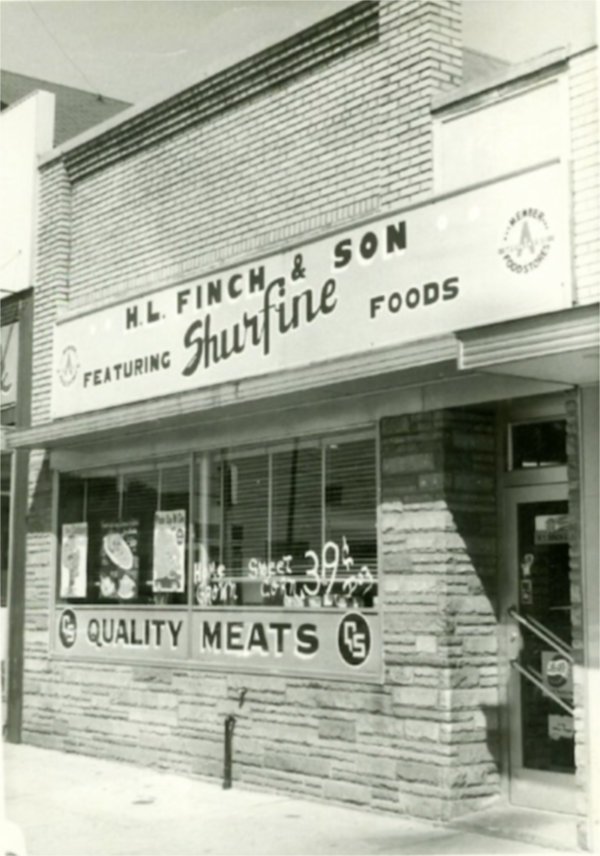
The H.L. Finch & Son market was located on the north side of Division just east of Union Street--courtesy of the Sparta Township Historical Commission Archives
"Ever since the "big feed", Hugh Finch has been telling the boys who patronize Frank Cnossen's "Dunkin' Club" how he pulled a fast one on the editor. Says Hugh, "We served choice steaks to all the boys that night except Kurtz. We gave him a bun with a piece of steak in it that it was so tough it took the red hot charcoal fire a half hour to turn it brown. I cut that piece of steak out of the neck of an "old bull" I butchered recently and then tied it in several knots before placing it in the pan. Kurtz chewed on it for fully a half hour. He ate all the bun and licked all the grease off his fingers..."
Clare Everett Finch
At twenty-seven, Clare married Helen Agnes, daughter of Anthony & Agnes Carol (Bell) Van Vuren. The wedding took place on Feburary 8, 1941, at St Joseph, Indiana. He served during World War II and received an honorable discharge with the rank of Sergeant. Hugh died in 1949, at which time Clare took over the business and lived in the family home at 134 W. Division. The 1950 Federal Census indicated Clare put in 65-hour work weeks as the proprietor of his grocery and meat market. Helen worked 20 hours as a clerk at their business. Ray Badgerow, whose small market across town at Gardner and State Streets, purchased the meats he sold wholesale from Clare Finch.
Besides being an excellent butcher, Clare was well-known for his delicious Swedish potato sausage and he processed venison for area deer hunters. "Finch was known as a charitable man who provided home delivery, helped homebound folks and extended credit to those with rough finances," Larry Carter was quoted in a Grand Rapids Press article following Clare's 2004 death when news of his generous bequest to the Sparta Community Foundation was publicized. Carter, a foundation member, described Mr Finch as "a common man, not wealthy, beloved in a regular kind of way."
The Finches continued operating the market--which had been in the family for sixty-three years--until it was lost in the December 3, 1974 inferno which destroyed several downtown Sparta businesses. After the fire, Clare worked at Emmons Supermarket where he became friends with a young co-worker, Gary Geldersma. A Grand Rapids Press interview from 2005 stated that "Finch enjoyed hunting and fishing, which gave him fodder for the stories he liked to tell." According to Geldersma, "He loved the reputation as the biggest storyteller in town. We'd go partridge hunting, and we'd come back and he'd say he took three shots and got five partridges."
Frank Cnossen:
There's Friendship
in the Cup
Following a visit from William Atsma, a cousin who lived in America, twenty-one year old Franke Jelles Cnossen left his home and family in the Netherlands on January 3, 1910, to sail from Rotterdam in search of his American Dream. The passenger manifest for the ship Nieuw Amsterdam, which docked on March 28, 1910, described Franke as a 5'8" tall "farm laborer" with blonde hair, blue eyes, a fair complexion, and stated he had $88.00 in his possession. The young man's destination would be Passaic, New Jersey to meet up with "Mr W. Alsman", the cousin on his mother's side, William Atsma, who was a coal dealer. The eldest son of a merchant, Franke was born on December 24, 1888, at Unitwellingerga to Jelle Baukes & Gertje Frankes (Atsma) Cnossen and lived at De Hommerts, Wymbritseradeel, Zuidwest-Friesland.
"He was in Wisconsin for two years and then returned to the Netherlands - came back to the United States just before the war in 1914," William Kuipers told the local Sparta newspaper. The men became acquainted while Frank boarded near William's Wisconsin in-laws' home. "He worked in Racine, Wisconsin at the Horlicks Malted Milk Factory... then he went traveling west for a couple of years. Then back to Wisconsin and stayed in a club house and got a job peddling milk."
Malted Milk
The Horlick brothers came from England. James, a pharmacist, and William formed the J & W Horlick Co. at Chicago in 1873 to manufacture dried baby food. They received a patent for their invention of vacuum dried milk combined with malted grains and trademarked "malted milk" in 1887. By 1906, the firm was renamed Horlick's Malted Milk Co. and relocated to Racine. Their health food product's nutrition and convenience soon caught the attention of explorers. As a friend of Admiral Richard Byrd in the 1930s, William sponsored several expeditions--both Artic and Antartic--and supplied them with malted milk. Byrd named a group of Antartic mountains in Horlick's honor.
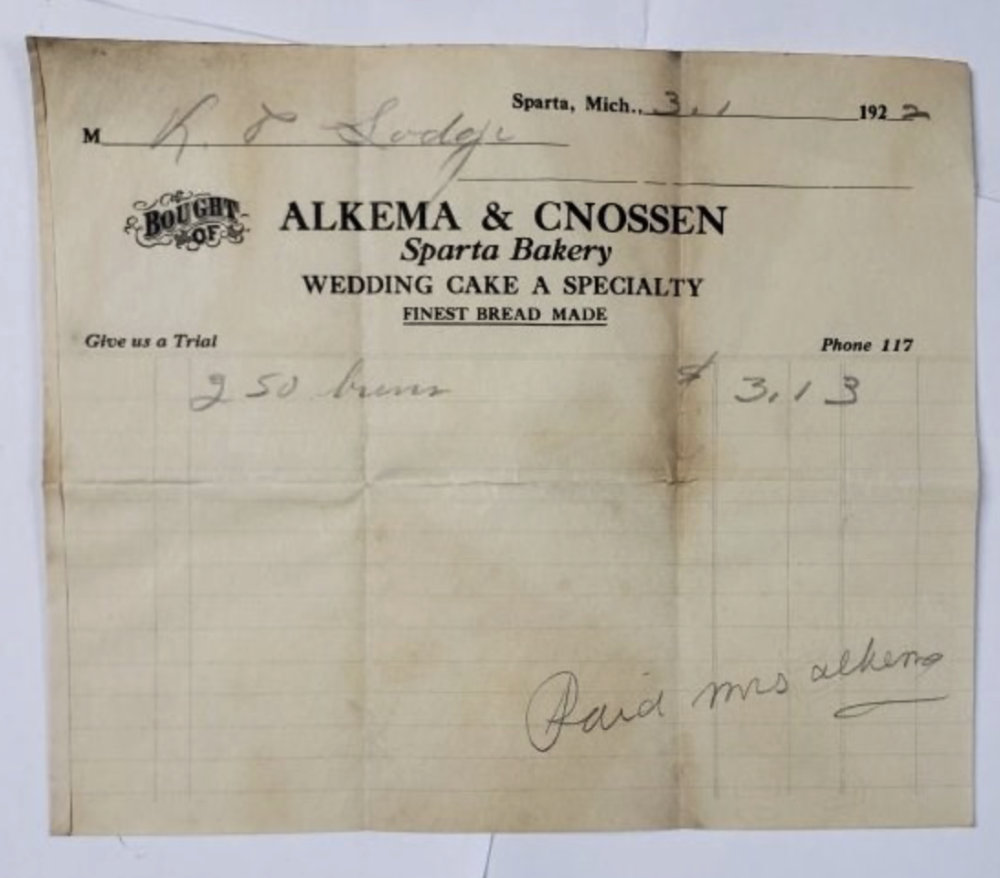
Dick Alkema and Frank Cnossen 1922 receipt for their Sparta Bakery--courtesy of the Sparta Township Historical Commission Archives
The beverage was marketed to the public as a powder to stir into a glass of water. When someone thought to mix it with ice cream, malts became a popular menu item at soda fountains or malt shops.
Sparta Bakery
Derk Alkema, known as "Dick", was a baker from the Netherlands who resided on Grandville Avenue in Grand Rapids when the 1920 Federal Census was enumerated. Frank Cnossen was employed at a furniture factory and boarded with the Alkema family. Within a couple of years, Frank had learned the baker's trade and they arrived at Sparta. "He (Frank) and Mr. Alkema started a bakery and coffee shop. After three or four years, Mr. Cnossen bought out Mr. Alkema. Consequently, he became sole owner of the Sparta Bakery and operated it until his death," Frank's friend, Mr. Kuipers, explained.
Poking good-humored fun at newcomers, the local paper placed an article entitled "EVEN AS ALL MEN ARE ALKEMA AND CNOSSEN" on the front page. It read: "Mrs Dick Alkema returned from her stay at Camp lake just about in the nick of time, it is said confidentially."
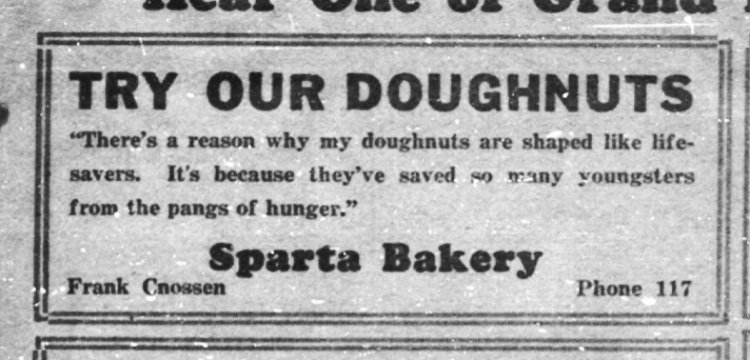
Frank Cnossen's sense of humor showed in an advertisement from The Sentinel-Leader (28 Jun 1934)--from the STHC newspapers repository
"Dick and his associate Frank Cnossen may be and are first rate bakers, but so far have not acquired any particular reputation as housekeepers, particularly in Mrs Alkema's estimation. During Mrs Alkema's absence it is said that practically all of the buttons had disappeared from the raiment of the men folks, they were unable to locate a change of shirts, underclothing or other needed apparel."
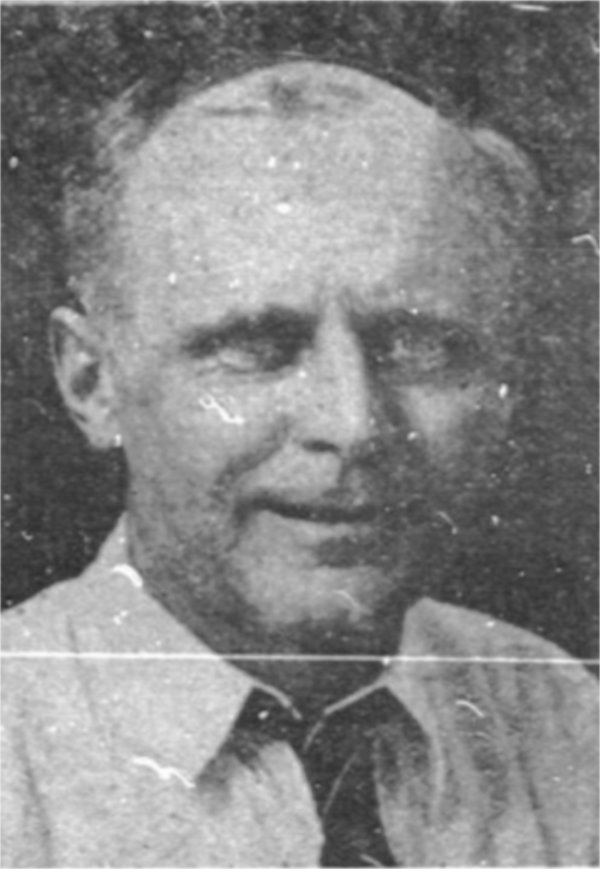
Frank Cnossen in 1936--the STHC newspapers repository
"In such a desperate condition they were found and it is a question of just how long it would have been before they would have taken to the woods and caves and arrayed themselves as primitive men. This story is no particular libel on Alkema or Cnossen, for there is no doubt that in nine out of ten houses in Sparta the same condition would have prevailed under the same conditions."--Sparta Sentinel-Leader published 23 Jun 1922
With a baker's workday beginning in the wee hours of the night, it made sense for Frank to keep the convenient upstairs living quarters. Sparta Bakery soon became the place to meet for coffee and conversation in downtown Sparta. The regular crowd became known as the "Dunkin' Club" at the bakery. One could always count on delicious baked goods served with a smile and smooth coffee.
"We have all kinds of people in Sparta, but only one baker." A July 1936 issue of the Sentinel-Leader focused on Frank in a "Know Your Sparta Merchants" feature, "Cnossen's a jolly good fellow. Never known to complain, always ready to do his part when it comes to boosting the town. Sells a mighty fine line of bread, doughnuts, cookies, buns, and pastry of all kinds. Also serves lunches and good coffee. Cnossen came to Sparta in 1922. Bought the bakery business from Bruno Shoemaker and later purchased the building. He learned his trade in Grand Rapids. His greatest hobby is fishing. Likes to tell fishing stories when Hugh Finch isn't around. His helpers are Mrs Joe Baxter, Mrs Ivan Blanchard, and Bobby Stebbins."
"TRY OUR DOUGHNUTS--There's a reason why my doughnuts are shaped like lifesavers. Its because they've saved so many youngsters from the pangs of hunger." Frank's sense of humor showed in a 1934 advertisement. Gotta love it!
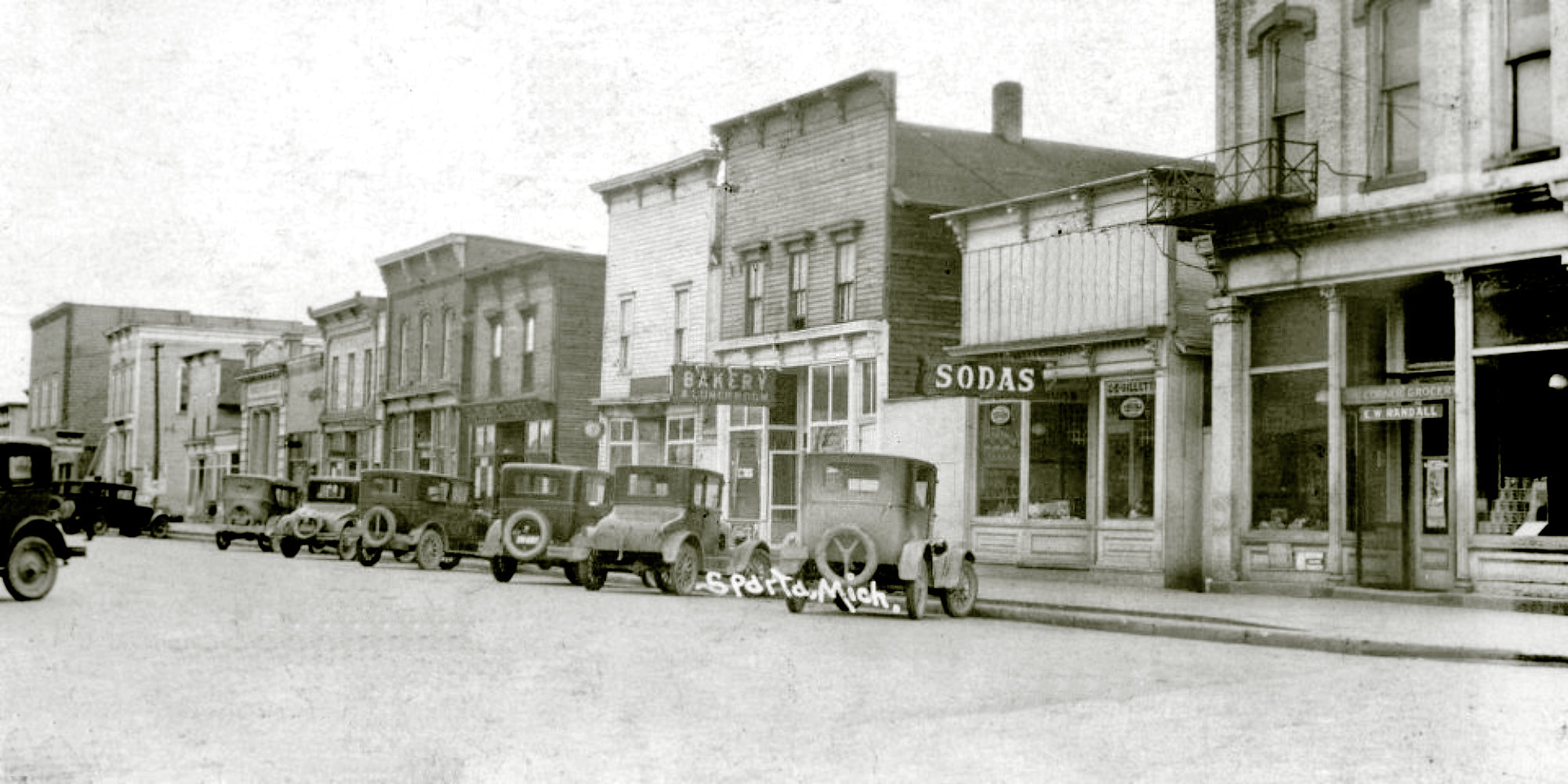
The south side of Division Street with Frank Cnossen's "Bakery & Lunch Room"--from the STHC archives
Eventually, bachelorhood brought Frank to the point of consideration of the future of his legacy. On one of his trips back to the Netherlands to visit family, he offered a nephew the opportunity to come to learn the trade with the hopes he might continue operation of the bakery someday. Jim Cnossen accepted and came to Sparta about 1957 to work for his uncle.
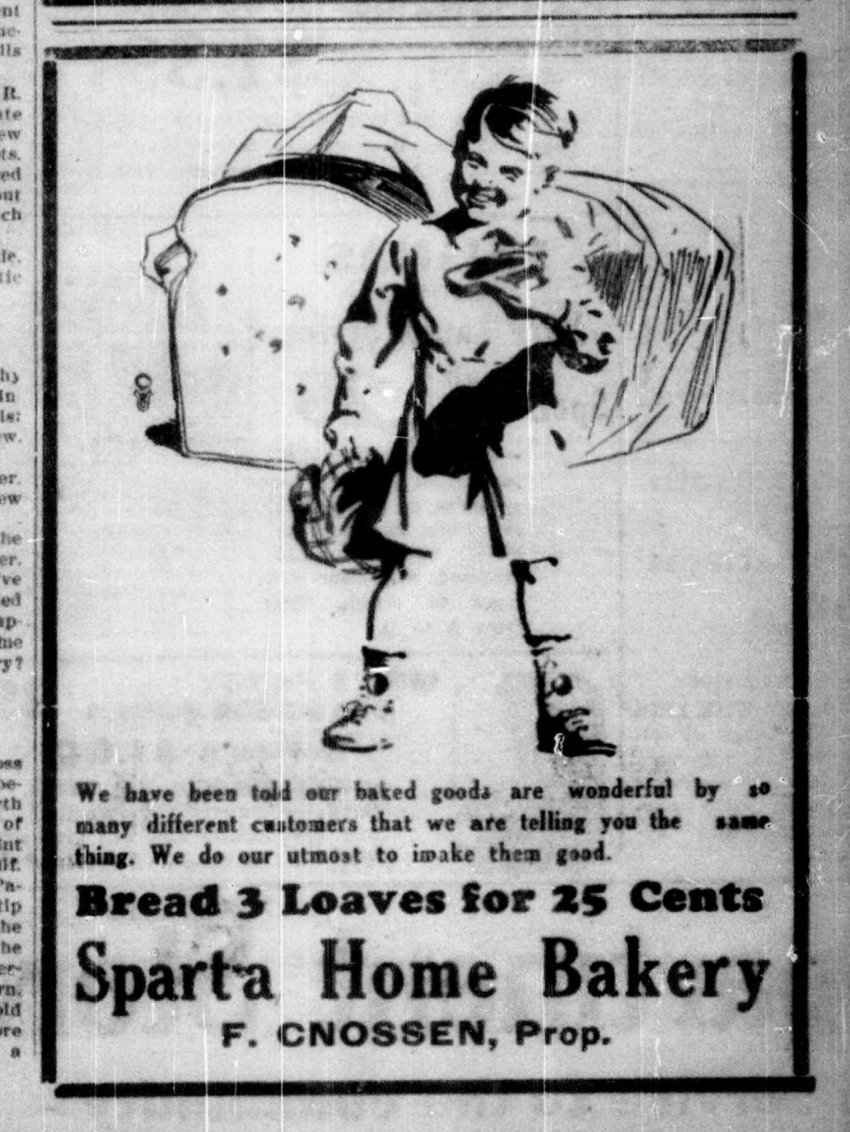
Sparta Bakery ad printed in the Sentinel-Leader on 30 April 1929--from STHC's newspapers repository
Newspaperman H.J. Kurtz knew his friend well, "Frank Cnossen's greatest delight seemed to be in serving children, teen-agers, and grownups alike. He was never known to pass up the opportunity of contributing his time, financial means and talent towards anything which meant a more prosperous, advanced and friendly area for a growing town."
"His place of business was noted for its old-time hospitality."
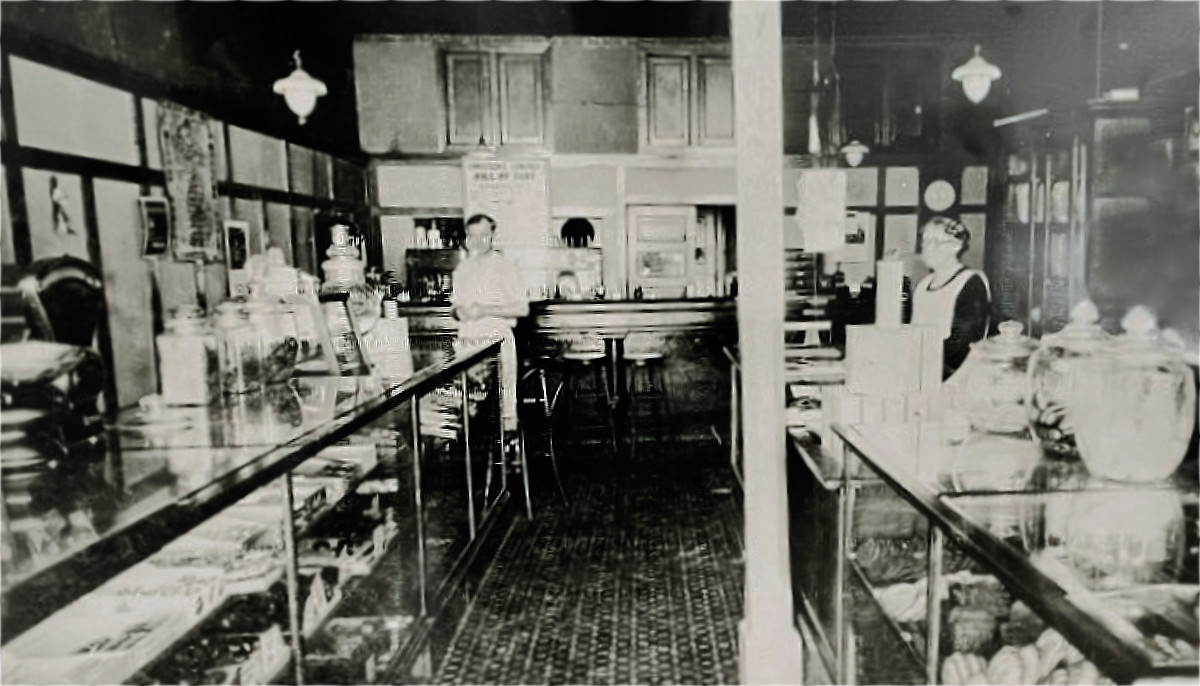
Frank Cnossen and his Sparta Bakery--courtesy of Mike Cnossen
"Although he had been in this country since a young man, he still retained a certain old-world charm," said Kurtz.
"For many years the lunch room in the Sparta Bakery has been the scene of happy gatherings of good friends for morning coffee, or a noon day lunch with Frank as a genial host, as a dispenser of good cheer and appropriate jokes and nothing of the sordid or foul nature." O.E. Balyeat reflected on the man he knew, "He considered every man as a friend and remarked in almost his last hour that he did not think he had an enemy. What a satisfying thought that must be in one's last moments."
"There is now a "vacant chair" at the bakery," Editor Kurtz penned in a memorial tribute after the baker's passing on October 11, 1963, "but Frank will always be remembered for his sweet spirit, quiet humor, lovable personality, his sterling character and business integrity."
A slogan which often appeared in Frank's advertisements: "There's Friendship in the Cup" was heartfelt.
"Friendship is not easy to define--however, someone has said it nicely, "A friend is one who walks in when the rest of the world walks out." Frank was known for his generosity, his willingness to contribute time and money to any worthwhile project. He loved to make new friends and he would go to the full mile to hold those friendships," reflected William H. DeHart. "To me and I am sure I speak for many, many others--Frank certainly qualified as a friend, a fine citizen, a Christian, and a man among men."
Charles Henry Loomis
Winter gave way to warm southernly breezes and heralded the change of seasons. Spring ushered in new life to the mountains of Franklin County, Vermont and, on April 25th, 1853, a newborn son was delivered to Henry M. & Ann M. (Blair) Loomis at their township of Georgia home. They named him Charles Henry.
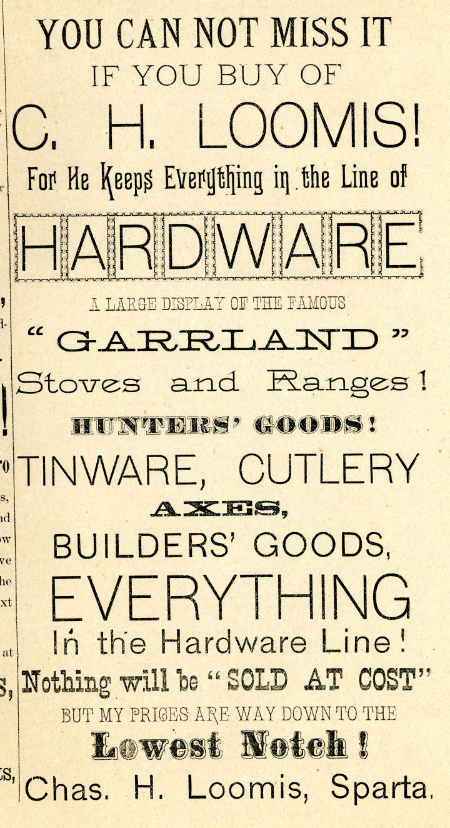
C.H. Loomis advertisement published in the Sparta Sentinel on 22 Feb 1889--courtesy of the Karl Nickolai Collection
At about 1858, the family relocated to the wilderness of Brooks Township in Newaygo county, Michigan, where Henry and his brother, William, became successful lumbermen. By 1860, Henry also operated a boarding house two miles from the Village of Newaygo. That same year, they donated a sizable sum towards the construction of the Methodist Episcopal Church and were appointed Trustees by the pastor, Rev. Thomas Granger. The Loomis brothers' business boomed as they brought 2,500,000 feet of lumber down the Muskegon River in 1863. Henry partnered with Henry Kritzer to rent "Newaygo Mills" on Brooks Creek in June of that year and the future looked bright, but by December, Mr. Loomis had died.
Ann married Rev Horace H. Bement and by 1870, they resided at Rockford with Charles, who was seventeen. In The History of Kent County a biographical sketch was included for Charles: His advantages for education were good, and he studied for a practical druggist. In 1875 he established his first business at Sparta Center, where he has a stock of $5,000 worth of drugs and articles usually included in similar enterprises and suitable to a country trade.
On August 5th, 1876, Charles married Mary A. Heath at Cambridge, Lamoille County, Vermont, officiated by his step-father. The bride's parents were Madison O. & Amanda (Mott) Heath; her father a lawyer who soon practiced his profession at Sparta.
By 1884, Charles had sold out his pharmacy business to become the proprietor of a hardware store in 1885, and was appointed Post Master in July 1897.
SPARTA STORES ROBBED.
Alleged Burglars Caught While Dividing the Swag.
Grand Rapids, Mich., September 20.--(Special.)--George French's jewelry store and C.H. Loomis' hardware store, both at Sparta, were robbed early this morning, the three burglars securing a large number of gold watches and a job lot of revolvers and cutlery. The thieves were surprised in the jewelry store, but escaped. The sheriff's office here was telephoned to and four deputies were sent out in pursuit of the men. They overhauled them at Englishville at daybreak, surrounded the woods into which the burglars had disappeared and captured them as they were sitting on the ground dividing their plunder. The three have been identified as Lon Campbell, Frank Arnold and Albert Thomas. Campbell is an old offender and skilled criminal.--published in the 21 Sep 1894 issue of the Detroit Free Press
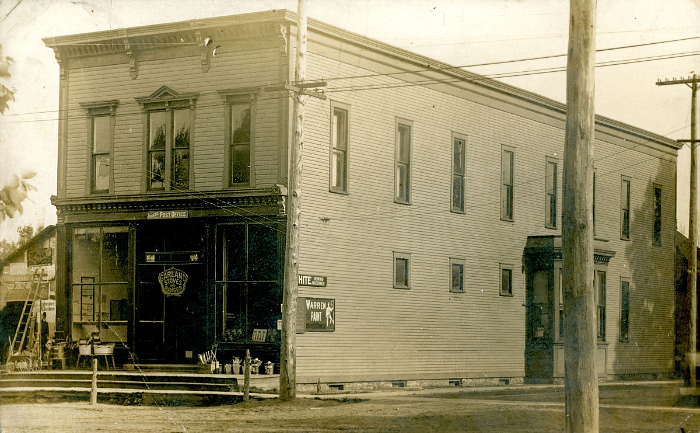
This postcard image is a street view of the Loomis building taken about a year or two after his death. It would have been when his successor Shelby Field owned the business. Field also became the Sparta postmaster as well.--courtesy of the Karl Nickolai Collection
A few days later, on the 28th, additional details on the crime spree were released:
There in a Bunch
The other morning burglars robbed the hardware store of C.H. Loomis and the jewelry store of George W French, at Sparta, taking valuable cutlery, revolvers, etc., from the former and a lot of watches, etc., from the other place. The thieves escaped. Word was telephoned to Grand Rapids, and Deputy Sheriffs Carroll and Gast hitched up a fast team and started for Sparta. When near Englishville they met three men who in the dim morning light looked like suspicious characters, and ordered them to halt. Two obeyed and the third ran, but stopped when a revolver shot came close to his head. All three were ordered to throw up their hands, and were promptly handcuffed and searched. The stolen property was all found on their person. The names of two of them are Dan Campbell and "Spat" Forbes, and the other is known by the soubriquet of "Slim". They are now in jail.--reported by the True Northern
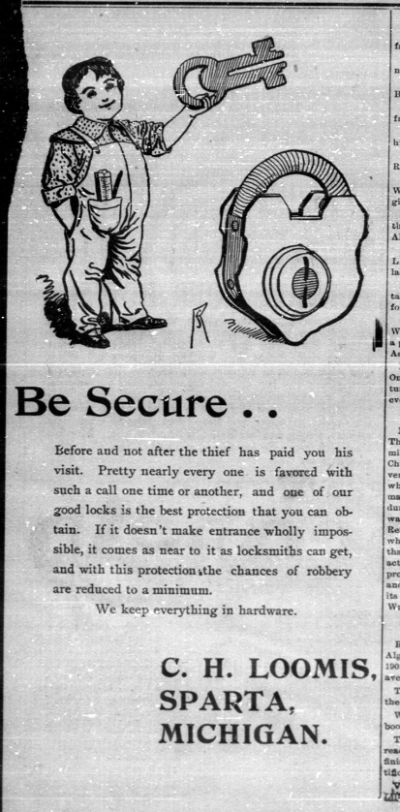
A local newspaper advertisement from 1901 for the C.H. Loomis hardware store from the STHC Newspapers Repository
Family Life
The Loomis family were blessed with three children with the arrival of Henry Madison in 1877, Clarence Black in 1888, and Charles Alden in 1895.
In adulthood, Henry became a barber "working on own account" in Sparta by 1910. He married Emma, the daughter of John and Jan Adeline (Ream) Emerson. John was a Danish immigrant who operated a grocery store at Sparta in 1910. Henry's WWI draft card stated he was barbering with Frank Kellogg. The 1940 Federal Census placed them at 219 Nash Street. In 1950, at the age of 72, was the Sparta Township Clerk.
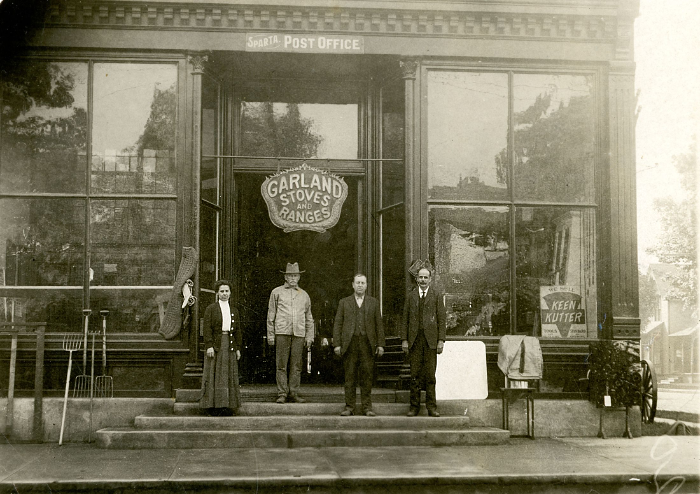
C.H. Loomis Building-Front [about 1908-10]. This postcard image is the front of the Loomis Building taken three or four years after his death. The configuration of front steps had changed since the earlier postcard image. The people standing in front are not identified, but since the message on the back was written by Shelby Field, I believe he must be one of them. As Arzie noted, Field was a longtime clerk for Loomis and bought the business after Loomis died. Field was 46 years old in 1910, so he could be one of the two men on the right. The woman on the left could be his wife Linnie (Brown) Field who was 42. The older man in the hat might be Linnie’s father John Brown, age 69, who was living with the Fields in 1910.--courtesy of the Karl Nickolai Collection
Son Clarence became the Secretary of the Y.M.C.A. as he relocated to the East Coast. In August 1914, while a resident of Norfolk, Virginia, he wed Eva Burtch at Sparta, the daughter of Manly W. & Mary E. (Greiner) Burtch. His mother resided with the family by 1920 at New Haven, Connecticut, followed by a move to Dekalb, Georgia, before 1930. A decade later, Clarence was a Professor at Greenville, South Carolina. Clarence retired to California where, in 1971, he passed away at San Diego.
On 29 May 1917, Charles married Mae A. Burtch, the younger sister of Clarence's wife, Eva. He brought his bride to his home at Newport, Virginia, where his occupation was that of a ship inspector. By 1940, they lived at Washington D.C. where Clarence was an Architect employed by the Navy. He also retired to San Diego, California.
"I remember the C.H. Loomis Hardware store," wrote Arzie L. Pinckney. Although he didn't know specifically when he built the hardware store, he noted it would later become the Wm A. Rogers and Co. Hardware store. "He built a beautiful home on the southwest corner of W. Division and Pleasant Streets. They were the first family to install a coal furnace in their home, but it had to be remodeled before it proved to be a very efficient heating system as the cold air was all taken from out-of-doors and it took a ton of coal a week and then it didn't heat the house very well."
"I remember that for some years the second floor of the store was used as a roller skating rink."
"Everything was fine for the Loomis family, so in the summer of 1905 they decided to go on a camping trip with Professor and Mrs. L.L. Coates. (Mr. Coates was superintendent of the Sparta School at that time.) They selected Bostwick Lake as the best place. After getting the tents up and everything settled, suddenly tragedy struck."
"About six o'clock in the morning, Clarence and his father were out on the lake casting for bass. Charles had been doing the rowing only a few minutes before giving the oars to Clarence when he gasped for breath and fell back into the water. Clarence dove into the water and managed to get him into the boat. He called for help, wakened Mrs. Coates, and she ran to the nearest house for help. There were no other boats on the lake so that by the time that help got there, Clarence had gotten his father to shore by hooking his coat collar to one of the oarlocks and towed him to shore."
A newspaper tribute noted, "Mr. Loomis was best known as a friend of the poor"; an honorable legacy.
Recalls Time When Nothing but Rail Fence Stood West of First Baptist Church
By H.M. Sleeper
published in the 9th of December 1935 issue of the Sentinel-Leader
"My snug little chamber
Is crammed in all nooks
With worthless old nicknacks
And silly old books."
In visiting your village the other day, I stood in front of the Baptist church and as I looked west and shut my eyes what did I see?
That whole corner enclosed by a rail fence, no buildings within a mile, south or west, the white school house and the farm of Bill Gaines. What more did I see? Coming down the road, Warren Burr with his ox team. They swung around the corner and came up to me and Burr asked me if I could drive oxen. Oh, the ignorance of youth. I was about 13 and I said, "yes."
We opened the rail fence and drove through with the harrow. I followed that team around until I was fully convinced that it's not everyone who can drive oxen.
Those were about the days when the Rev E.W. Norton left his farm on the Town Line, after six days of farm work, and came up to deliver a good sermon to us on Sunday. Those were the good meetings. Were those early pioneers more receptive to the spirit of those lessons, or is it the present day observance more acceptable to the people?
My father being a blacksmith had dealings with many and and very likely with a few disagreements. A neighbor came to him and asked him to forget any word or act of his that reflected on their dealings. Being unaware of anything that is not likely to occur in any business the request was granted, and the respect and confidence in and for that man rose 100 per cent and as he shook hands with C.J. Martindale he knew he had secured a lifelong friend.
The moral and social function of Sparta's future was built by such men and women.
But they soon began to build on that vacant corner. Frank Evertz, Dr. Babcock, Jackson Hinman, George Rogers, Cap. Schmidt, C.H. Loomis, well you know all those names. They are recorded in the "Silent City" west of the village.
When I opened my eyes the change of scene was surprising. But not unexpected knowing the people as well as I did.--H.M. Sleeper
Contact
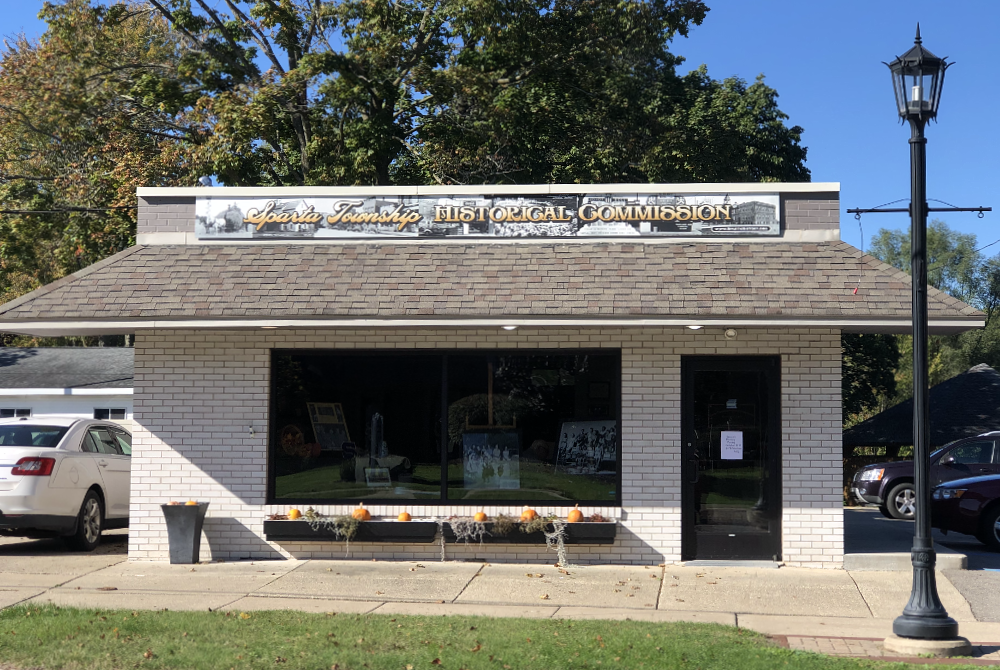
Sparta Township Historical Commission headquarters at 71 North Union Street
Our History Center is conveniently located at 71 North Union Street in downtown Sparta. Please join us for coffee and lively conversation on Monday mornings. Visits to the History Center can also be scheduled by appointment, for your convenience.
We do not receive mail at the History Center, instead, please use our mailing address, which is:
attn: Sparta Township Historical Commission
Sparta Township
160 E. Division St.
Sparta MI 49345
Our complete archives are now available online for your convenience. Just click STHC PastPerfect Catalog Access and begin your research!
For other inquiries, the Sparta Township Historical Commission can be reached by phone at: (616)606-0765 or via email at the following address:
